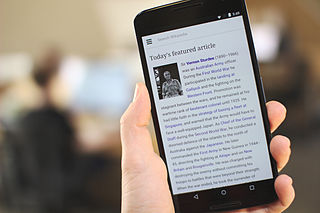
A smartphone, often called simply a phone, is a mobile device that combines the functionality of a traditional mobile phone with advanced computing capabilities. It typically has a touchscreen interface, allowing users to access a wide range of applications and services, such as web browsing, email, and social media, as well as multimedia playback and streaming. Smartphones have built-in cameras, GPS navigation, and support for various communication methods, including voice calls, text messaging, and internet-based messaging apps.
A mobile operating system is an operating system used for smartphones, tablets, smartwatches, smartglasses, or other non-laptop personal mobile computing devices. While computers such as typical/mobile laptops are "mobile", the operating systems used on them are usually not considered mobile, as they were originally designed for desktop computers that historically did not have or need specific mobile features. This "fine line" distinguishing mobile and other forms has become blurred in recent years, due to the fact that newer devices have become smaller and more mobile, unlike the hardware of the past. Key notabilities blurring this line are the introduction of tablet computers, light laptops, and the hybridization of the two in 2-in-1 PCs.

The Samsung Instinct (SPH-M800) was an Internet-enabled smartphone designed and marketed by Samsung Mobile. It uses a Haptic touchscreen interface, and three touchscreen buttons. The Instinct, in addition to being a mobile phone, also functions as a camera phone, portable media player, text messenger, and a complete web browser and e-mail client. The email client allows for access to only the main inbox of any associated account – not to any subfolder. The folders for "drafts", "sent", "deleted", and "outbox" represent only messages originating from the phone.
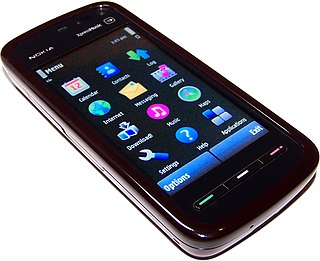
Nokia 5800 XpressMusic is a smartphone part of the XpressMusic line, announced by Nokia on 2 October 2008 in London and started shipping in November of that year. Code-named "Tube", it was the first touchscreen-equipped S60 device by Nokia – essentially it was the first device to run Symbian^1, also known as S60 5th Edition, the touch-specific S60-based platform created by the Symbian Foundation. The touchscreen features tactile feedback.

The Samsung SGH-F480, marketed and branded as Tocco in many English-spoken countries or as Player Style in France, is a touchscreen smartphone announced in February 2008 and released in May 2008 by Samsung Mobile. Taking design cues from its Armani-branded P520, the Tocco was Samsung's third touchscreen smartphone and was the first to come with the TouchWiz user interface. It came in three colours: black, pink, and gold.

Samsung GT-i8910 Omnia HD is a smartphone manufactured by Samsung Electronics, first announced at MWC 2009 on February 18, 2009. The device was the first phone capable of playing and recording 720p HD video. It runs on the S60 5th Edition (Symbian^1) platform, the only Samsung device to do so.

The Samsung Omnia II GT-I8000(H/L/U) is a multimedia smartphone announced at Samsung Mobile Unpacked on June 15, 2009. Earlier Omnia II releases run Windows Mobile 6.1, however they are upgradable to version 6.5 Professional. There is also an unofficial and experimental Android version available. Verizon is the official US carrier for this phone and released it in December 2009.
The LG GR500 is a mobile phone manufactured by LG Electronics, which features a touch screen and QWERTY keyboard on AT&T's 3G network. It was released April, 2009, compared to 2007 for the first iPhone and 2008 for the first Android phone. It offers a flash for the 2.0 mega pixel camera, GPS, multi tasking, a menu or favorite contacts, and a microSD slot for music, pictures, and video. Voice dialing and video share are among the features on this phone. Newer models of the phone also include a front-facing camera for video chat, that is incapable of recording video or pictures. The LG Xenon does not have Wi-Fi capability.
The Samsung Behold II is a touch-screen, 3G- compatible smartphone with a 5.0-megapixel camera. The Samsung Behold II is powered by the Android OS, making it the fourth Android powered phone by T-Mobile USA. Other Android powered phones by T-Mobile are the G1, myTouch 3G, and the Motorola CLIQ. It was released on November 18, 2009. On May 27, 2010, Samsung announced that Android 1.6 "Donut" would be the final firmware release for the device.
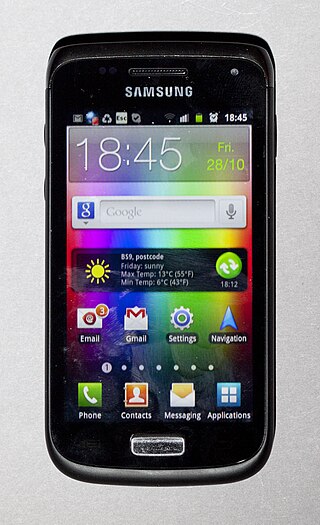
Samsung Galaxy W (i8150), also known as Samsung Wonder, is an Android smartphone that is a smaller-sized variant of Samsung Galaxy S II.

The Samsung Moment, known as SPH-M900, is a smartphone manufactured by Samsung that uses the open source Android operating system.

Samsung GT-S5230, variously marketed as Tocco Lite, Avila, Samsung Star and Samsung Player One, is an entry-level touchscreen smartphone announced in March 2009 and released in May 2009 by Samsung. It was highly popular as a cheap touch phone, with Samsung reporting sales of 30 million by December 2010.
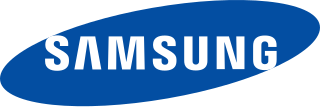
The Samsung Wave S8500 is a smartphone developed and produced by Samsung Electronics. It is the first smartphone to run the Bada operating system developed by Samsung Electronics, which was commercially released on May 24, 2010. The Wave is a touchscreen phone powered by Samsung's "Hummingbird" CPU (S5PC110), which includes 1 GHz ARM Cortex-A8 CPU and a built-in PowerVR SGX 540 graphics engine. It also has a "Super AMOLED" screen and 720p high-definition video capture capabilities. Due to shortage of Super AMOLED screens, Samsung released a successor to the device called Wave II and ceased production of the original S8500 model.

The Samsung Galaxy S is a touchscreen-enabled, slate-format Android smartphone developed and marketed by Samsung Electronics; it is the first smartphone of the Samsung Galaxy S series. It is the first device of the third Android smartphone series produced by Samsung. It was announced to the press in March 2010 and released for sale in June 2010. After the release of Android 2.2 "Froyo" for the Galaxy S, Samsung released a successor to the device called S scLCD or SL and ceased production of the original I9000 model due to shortage of Super AMOLED displays.

TouchWiz is a discontinued user interface developed by Samsung Electronics with partners, featuring a full touch user interface. It is sometimes incorrectly referred to as an operating system. TouchWiz was used internally by Samsung for smartphones, feature phones and tablet computers, and was not available for licensing by external parties. The Android version of TouchWiz also comes with the Samsung-made app store Galaxy Apps. It was replaced by Samsung Experience in 2017 with the release of Android 7.0 "Nougat".
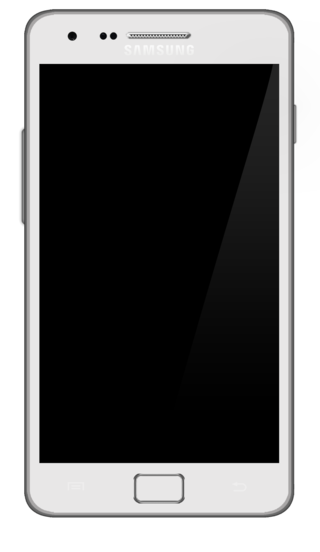
The Samsung Galaxy S II is a touchscreen-enabled, slate-format Android smartphone developed and marketed by Samsung Electronics, as the second smartphone of the Samsung Galaxy S series. It has additional software features, expanded hardware, and a redesigned physique compared to its predecessor, the Samsung Galaxy S. The S II was launched with Android 2.3.3/2.3.4 "Gingerbread", with updates to Android 4.1.2 "Jelly Bean".

The Samsung Galaxy Mini (GT-S5570[B/L/i]) is a smartphone manufactured by Samsung that runs the Android operating system. It was announced and released by Samsung in early 2011. In some markets it is known as Samsung Galaxy Next/Pop/NG, while it is sold in the United States as the Samsung Dart exclusively for T-Mobile. It is currently available in four different colors; steel grey, white, lime and orange. With this release, the face buttons were changed to capacitive touch, matching the rest of the Galaxy lineup.
The Samsung Galaxy Tab 7.7 was a tablet computer of a series of Android-based tablet computer produced by Samsung, introduced on 1 September 2011 at IFA in Berlin. Related models are the Galaxy Tab 7.0 Plus, Samsung Galaxy Tab 2 7.0, and Samsung Galaxy Tab 3 7.0.
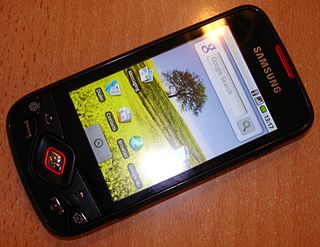
The Samsung Galaxy Spica, also known as Samsung Spica, Samsung GT-I5700, Samsung Galaxy Lite and Samsung Galaxy Portal, is a smartphone manufactured by Samsung and introduced in 2009 that uses the open source Android operating system. The phone is positioned below the original Samsung Galaxy. Even though some of its features like the camera resolution, storage and data connection speeds are lower than the i7500, its processor's clock speed is much higher at 800 MHz. It is succeeded by the Samsung Galaxy 3.















